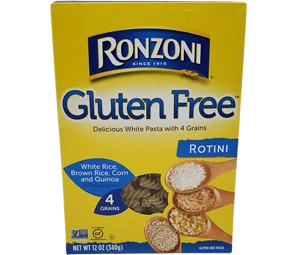
Ronzoni
Flavor:
Gluten Free® Rotini
Ingredients:
White Rice Flour Brown Rice Flour, Corn Flour, Quinoa Flour, Mono and Diglycerides
Rating: Average
- 3 out of 5
Ingredient Score:
Ronzoni Gluten Free® Rotini earns a score of 3 out of 5 green leaves on our scale. This rating reflects a product that balances the need for gluten-free options with some concerns about its composition and environmental footprint. The pasta is made from a blend of white and brown rice flour, corn flour, quinoa flour, and includes mono and diglycerides.
While the product is gluten-free, catering to those with celiac disease or gluten sensitivities, it is not organic. The absence of organic certification means that the ingredients may have been produced with conventional farming practices, which often rely on synthetic pesticides and fertilizers. However, the pasta does use non-GMO ingredients, ensuring that consumers avoid genetically modified organisms, which some prefer to steer clear of for health or environmental reasons.
One ingredient that raises concerns is the inclusion of mono and diglycerides. These emulsifiers are common in processed foods but can be sourced from both plant and animal origins, which may not align with certain dietary preferences or restrictions. Moreover, there is debate over the health implications of these additives, leading to the significant deduction in the product’s score.
The Ronzoni Gluten Free® Rotini is positioned as an accessible alternative for those seeking gluten-free pasta options. The choice to incorporate quinoa flour is a positive aspect, as quinoa is known for its nutritional benefits, including a higher protein content compared to traditional pasta ingredients. However, the lack of organic certification and the presence of mono and diglycerides temper the product’s overall appeal to health-conscious consumers looking for ‘cleaner’ food options.
The product stands as a middle-ground option: it provides a necessary dietary accommodation without fully committing to the cleanest ingredient list or sustainable production methods. For consumers prioritizing gluten-free products, it serves as a viable choice, while those with a stricter focus on organic or additive-free foods might continue their search for a product that better aligns with their values.
Certifications:


Product formulations and certifications may change. For current nutrition facts and ingredient
line information, check product packaging.
Categories:
Alternatives
No Items found.
How We Rate
Every company today has a responsibility to be a net positive for the planet,
for society, and for our ecosystem











